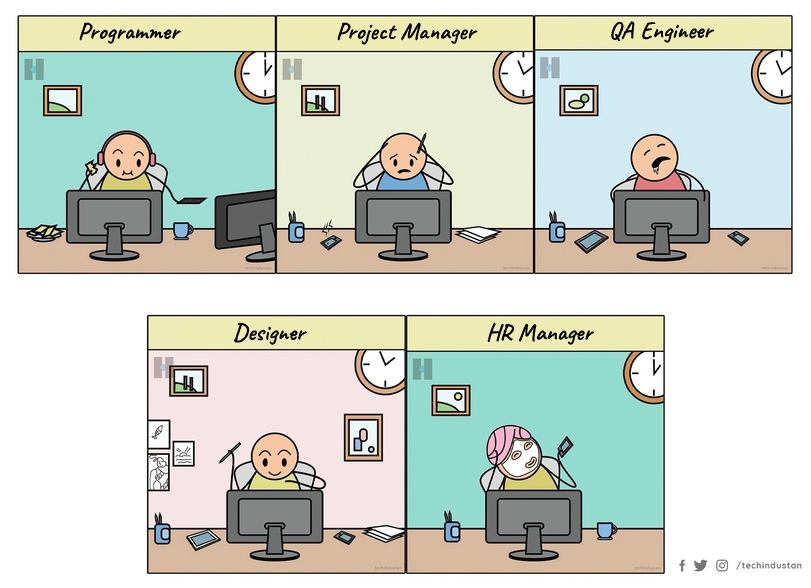
Entering IT is not an easy task, especially if you are changing careers and diving into an unfamiliar field from scratch. At the start you are haunted by incomprehensible terms and concepts, and the minimum requirements of jobs seem impossible to fulfill. Gaining new knowledge is never without challenges, so the key is not to give up.
Why become a programmer at all?
To begin with, it is worth answering this very question, so as not to build false hopes and unreasonable expectations of the field. IT as any other field has its own characteristics and is not suitable for everyone. On the plus side:
Remote Work
In most of IT professions you can work from anywhere in the world and not to remember about going to the office.
Seamless transition between different specializations
For example, if you write code for iOS and want to switch to Android, you do not need to learn for years from scratch.
Technological revolution
New apps, devices, and technology turn the world upside down and make it better almost every year. Even the humblest junior developer or tester becomes an integral part of this global process and contributes to the advancement of technology.
There are also disadvantages:
Mental strain. For most people, working in IT closes the need for money, but it also opens up new problems. Burnout, impostor syndrome, and anxiety become typical companions of IT workers, which are important to deal with
Frequent job changes and constant learning. The field is unlikely to suit people who want to do a non-dusty job and get paid for it over the years. If your motto is like the man in the picture below, it is better to look at work in another field. It's normal for a programmer to change jobs every year. New technologies and tools have to be learned all the time too, so that you don't lose your value in the market.
The general culture of the "programming" profession emerges from these features. It places great emphasis on learning and self-development, healthy relations between company employees, and an opensource culture where a bunch of useful tools are created and maintained by the developer community.
It's especially useful to try your hand at IT for those who feel stagnant in their current profession. When you see how year after year your current job looks more and more like a quagmire, the salary is not growing, and interesting tasks are not added, then it is a great idea to try something fundamentally new.
How not to quit study in the middle of the road?
It helps to protect yourself from being drained during training by setting clear goals. Think about what results you want to achieve in 3-5 years: who you want to work for, how much money you want to get, and what you want to have. And it's also important to understand what you will lose during this time, if you do not achieve your goals.
If you feel stuck, do not hesitate to ask for a programming assignment help: an experienced professional can show you how to solve a problem in a gight way – just don't give up immediately and try first to get it done by yourself.

You can use tactical tricks. For example, learn a little bit, but every day – so you form a habit, which will not be easy to merge emotionally in a single day. It is also useful to remember about the discipline: if you are going to learn, start a course, an IDE, or any other tool that you are planning to use. Teach yourself not to be distracted by a tweet or a short video on Youtube before practicing. If your motto is like the man in the picture below, it is better to look at work in another field. It's normal for a programmer to change jobs every year. New technologies and tools have to be learned all the time too, so that you don't lose your value in the market.
How long does it take to become a programmer?
If you spend a couple of hours every day practicing and not getting distracted, you can master the basic skills of popular programming languages in 4-5 months. There is always an element of chance: if there are few jobs when you enter the market, the search may take longer. And vice versa – if there is high demand, you can successfully jump into an internship at a company after a month of intensive study.
Hence the question of whether it's worth quitting your current job to devote all your time to studying to get into IT. With the heavy workload in your day job, it takes a lot of willpower to come home and sit down to write code instead of resting. Not many people can handle that kind of regimen. This does not mean that you have to quit your job, lose your salary, and immerse yourself in self-education. You can use some smart tricks, such as studying before work rather than after. Spend an hour or two, solve a couple of problems, or write a few lines of code while you have a fresh head and a reserve of productivity.
If after a couple of free courses it is finally clear that programming is appealing, you can quit your job. This will free up a lot of time and resources to study. But remember – all that time you will be without money. That's why it's important to have a financial cushion and not be in debt for this approach.
Is it really easier to get into IT as a tester?
The popular notion of an easy start through testing promises that you won't have to learn programming languages, and you can get your first job in as little as three months. The plan is great, but it doesn't work. The idea of becoming a developer through an "intermediate" profession is at least time-consuming – why not learn development right away? Besides, imagine how many thousands of people have decided to cheat like you, and look at the number of responses to Jun's tester jobs – the competition among newbies is huge. We talked about a typical day in the life of QA in a separate stream.
When do you start looking for a job?
Don't put off going to interviews for too long – start responding to job openings 3-4 months after you start training. Searching for jobs and talking to the job hunters and leads will help you navigate the hiring process and you'll sharpen your business communication skills. Also feel free to freelance: you can always find friends and acquaintances who need to create a telegram bot, help with a banding or something else. Simple but real tasks will form a useful practice that you can back up your resume with.
We often talk about which companies you shouldn't go to work for. But this conversation is always about professionals with experience who are in demand. You better compromise some of your principles at the start and remember that the main goal is to get a job. Let the first place not be the best atmosphere, tasks or co-workers. All of this can be survived in order to gain experience with real work on relevant tasks and to settle into your next job with some margin of safety. The same goes for government companies: the general rule is that it is better not to work there, but if this is your first job, it is foolish to turn it down.
Don't be intimidated by rejections. If you sent 100 responses, 60 were rejected, another 35 were unread, and as a result there was only one call with HR – this is normal. The main thing is that this should not be a reason for you to give up and stop looking for work. Finding your first job is always difficult for junks, but you can only break through that barrier by perseverance and patiently getting more responses.
And for all the love of telecommuting – it's better to find your first job in an office. This way it is easier and more intensive to get into the processes, learn the team's work from the inside and get the most out of your colleagues and the lead.

Written by Michael Zippo
Michael Zippo, passionate Webmaster and Publisher, stands out for his versatility in online dissemination. Through his blog, he explores topics ranging from celebrity net worth to business dynamics, the economy, and developments in IT and programming. His professional presence on LinkedIn - https://www.linkedin.com/in/michael-zippo-9136441b1/ - is a reflection of his dedication to the industry, while managing platforms such as EmergeSocial.NET and theworldtimes.org highlights his expertise in creating informative and timely content. Involved in significant projects such as python.engineering, Michael offers a unique experience in the digital world, inviting the public to explore the many facets online with him.
